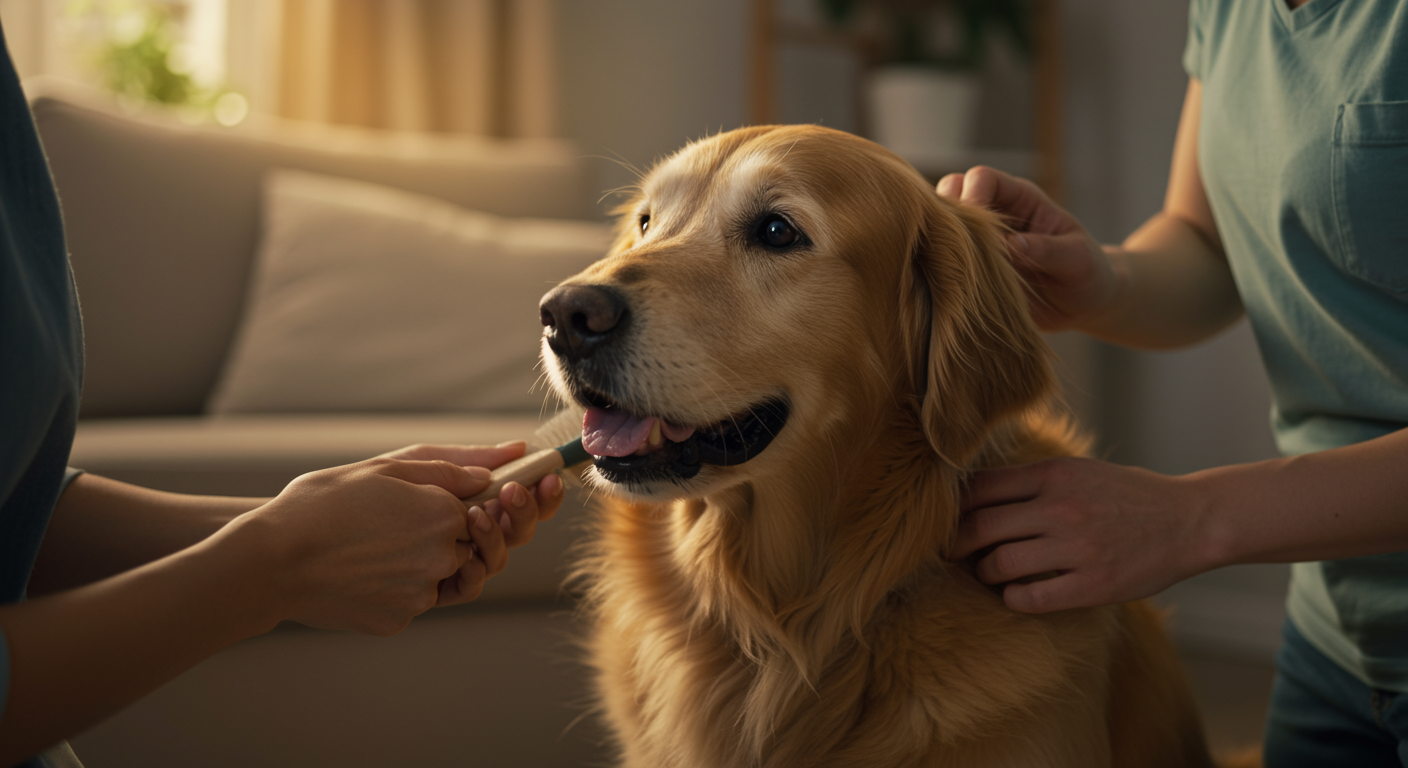Establishing comprehensive daily wellness routines for senior Golden Retrievers creates the foundation for maintaining health, comfort, and happiness throughout the golden years. These routines encompass physical care, mental stimulation, health monitoring, and emotional support that address the evolving needs of aging companions while providing structure and consistency they find comforting.
Daily wellness routines become increasingly important as Golden Retrievers age because consistent care helps identify health changes early, maintains physical function, and provides the predictable structure that senior dogs find reassuring. Well-designed routines make comprehensive care manageable for families while ensuring that no aspect of senior dog wellness is overlooked.
Effective daily wellness approaches integrate necessary care tasks with enjoyable activities, creating positive associations while addressing health maintenance, comfort support, and quality of life enhancement. Success comes from understanding individual needs while maintaining flexibility to adapt routines as capabilities and preferences change with age.
Morning Wellness Routine
Gentle Awakening and Assessment
Comfortable Morning Transitions
Senior Golden Retrievers benefit from gentle, unhurried wake-up routines that allow time for joints to warm up and stiffness to ease before beginning daily activities. Rushing into immediate movement can cause discomfort and set a difficult tone for the entire day.
Understanding morning stiffness helps families allow adequate time for natural awakening while providing gentle encouragement and support as senior dogs transition from sleep to activity.
Consistent morning greetings and calm interaction help establish positive daily beginnings while providing opportunities to assess overnight comfort and readiness for daily activities.
Daily Health Observation
Brief morning health assessments help identify changes in mobility, appetite, alertness, or comfort levels that may indicate developing health issues requiring attention or routine modifications.
Understanding what to observe during morning checks helps families gather valuable health information while making monitoring feel natural rather than clinical or stressful.
Simple observations of gait, breathing, appetite, and general demeanor provide important baseline information while helping families track patterns and changes over time.
Morning Care Activities
Elimination and Outdoor Time
Providing prompt outdoor access helps senior dogs maintain house training success while accommodating potentially reduced bladder control or mobility issues that affect elimination timing.
Understanding elimination needs helps families establish routines that prevent accidents while supporting dignity and independence in basic bodily functions.
Morning outdoor time provides fresh air, gentle exercise, and environmental stimulation that helps senior dogs start their day with positive experiences and natural behaviors.
Medication Administration
Consistent morning medication timing helps maintain therapeutic levels while establishing routines that make medication administration feel natural rather than medicinal or stressful.
Understanding medication scheduling helps families coordinate timing with meals, activities, and other care tasks while ensuring compliance with prescribed treatment regimens.
Positive associations with medication time through treats, praise, or pleasant activities help maintain cooperation while supporting necessary health management routines.
Daily Wellness Care Schedule
| Time Period | Wellness Activities | Duration | Focus Areas | Monitoring Points |
|---|---|---|---|---|
| Morning (7-9 AM) | Wake-up assessment, elimination, breakfast | 30-45 minutes | Comfort check, nutrition, basic needs | Mobility, appetite, alertness |
| Mid-Morning | Gentle exercise, grooming check | 20-30 minutes | Physical activity, hygiene maintenance | Exercise tolerance, coat condition |
| Afternoon | Rest period, mental stimulation | 60-90 minutes | Recovery, cognitive engagement | Comfort during rest, interest level |
| Early Evening | Social time, light activity | 30-45 minutes | Family interaction, gentle movement | Social engagement, energy levels |
| Evening | Dinner, relaxation activities | 45-60 minutes | Nutrition, winding down | Appetite, comfort preparation |
| Bedtime | Comfort setup, settling routine | 20-30 minutes | Sleep preparation, security | Comfort positioning, relaxation |
Nutrition and Hydration Wellness
Meal Planning and Presentation
Senior-Appropriate Nutrition Timing
Consistent meal timing helps regulate digestion while supporting medication schedules and providing the predictable routine structure that senior dogs find comforting and secure.
Understanding meal timing benefits helps families coordinate feeding with other care activities while ensuring that nutrition supports rather than conflicts with health management needs.
Multiple smaller meals throughout the day often work better than large portions, supporting easier digestion while maintaining consistent energy levels and reducing digestive stress.
Hydration Encouragement
Ensuring adequate water intake becomes increasingly important for senior dogs who may be less motivated to drink or may have increased fluid needs due to medications or health conditions.
Understanding hydration support helps families provide appealing water sources while monitoring intake patterns that could indicate health changes requiring attention.
Creative hydration approaches such as flavored water, ice cubes, or moisture-rich foods help encourage adequate fluid intake while making drinking more appealing and enjoyable.
Nutritional Health Monitoring
Appetite and Eating Behavior Tracking
Monitoring food intake, eating enthusiasm, and mealtime behaviors provides valuable information about senior dog health while helping identify changes that may indicate developing issues.
Understanding appetite patterns helps families recognize normal fluctuations versus concerning changes that may require dietary modifications or veterinary consultation.
Documentation of eating patterns helps track trends while providing valuable information for health care providers during routine visits or when concerns arise.
Physical Wellness and Exercise
Daily Movement and Activity
Age-Appropriate Exercise Planning
Senior Golden Retrievers require regular, gentle exercise that maintains muscle strength and joint mobility while respecting energy limitations and physical comfort needs.
Understanding exercise adaptation helps families provide beneficial activity while avoiding overexertion that could cause fatigue, pain, or reluctance to continue participating in physical activities.
Flexible exercise approaches allow for good days and difficult days while maintaining overall activity levels that support physical health and mental well-being.
Joint Support and Comfort
Daily attention to joint comfort through gentle massage, warm-up activities, and supportive positioning helps maintain mobility while providing relief from stiffness and discomfort.
Understanding joint support helps families incorporate therapeutic activities into daily routines while making joint care feel pleasant rather than medicinal.
Environmental modifications such as non-slip surfaces, comfortable bedding, and easy access help support joint health while preventing injuries that could worsen mobility issues.
Grooming and Hygiene Wellness
Daily Grooming Maintenance
Regular brushing, dental care, and hygiene checks help maintain cleanliness while providing bonding opportunities and health monitoring that supports overall wellness.
Understanding grooming benefits helps families establish routines that maintain hygiene while providing pleasant interaction that strengthens relationships and supports emotional well-being.
Gentle grooming approaches adapted for senior sensitivity help maintain coat health while ensuring that grooming remains comfortable and stress-free.
Skin and Coat Health Monitoring
Daily grooming provides opportunities to check for skin changes, lumps, or other abnormalities that may require attention while maintaining coat health through regular care.
Understanding what to look for during grooming helps families identify potential problems early while maintaining regular care that supports skin and coat health.
Seasonal grooming adjustments help maintain comfort while addressing changing needs related to weather, shedding patterns, or health status changes.
Mental and Emotional Wellness
Cognitive Stimulation Integration
Daily Mental Exercise
Incorporating puzzle toys, training activities, or problem-solving games into daily routines helps maintain cognitive function while providing enjoyable challenges adapted to senior capabilities.
Understanding mental stimulation needs helps families provide appropriate cognitive exercise while avoiding overwhelming activities that could create frustration or stress.
Variety in mental activities helps maintain interest while preventing habituation that could reduce the cognitive benefits of mental exercise and enrichment.
Social Interaction and Bonding
Regular family interaction, gentle play, and affectionate contact help maintain emotional bonds while providing social stimulation that supports psychological well-being.
Understanding social needs helps families balance interaction with rest needs while ensuring that senior dogs continue to feel valued and connected to family life.
Quality time activities adapted for senior energy levels help maintain relationships while providing meaningful experiences that enhance daily life satisfaction.
Emotional Support and Comfort
Stress Reduction Strategies
Creating calm, predictable environments helps reduce stress while supporting emotional well-being through consistent routines and gentle handling that builds security and trust.
Understanding stress management helps families identify and minimize stressors while providing emotional support that helps senior dogs feel secure and comfortable.
Comfort measures such as soft bedding, familiar scents, and quiet spaces help provide emotional security while supporting natural rest and relaxation needs.
Health Monitoring and Preventive Care
Daily Health Assessment
Systematic Health Observation
Regular observation of breathing patterns, gait, appetite, and behavior helps identify health changes early while providing baseline information for veterinary consultations.
Understanding health monitoring helps families recognize normal versus concerning changes while maintaining awareness of health status without becoming overly anxious about minor fluctuations.
Simple assessment routines integrated into daily care help ensure comprehensive monitoring while making health awareness feel natural rather than clinical.
Record Keeping and Documentation
Maintaining simple records of appetite, elimination, activity levels, and notable behaviors helps track patterns while providing valuable information for health care providers.
Understanding documentation benefits helps families maintain useful records while avoiding overwhelming record-keeping that could make daily care feel burdensome.
Digital apps or simple written logs can help track health information while ensuring that important patterns and changes are noticed and remembered.
Preventive Care Integration
Medication and Supplement Management
Consistent administration of prescribed medications and supplements helps maintain health while preventing the progression of chronic conditions that could affect quality of life.
Understanding medication importance helps families maintain compliance while integrating pill-giving into pleasant routines that reduce stress for both dogs and caregivers.
Organized medication systems help prevent missed doses while ensuring that complex medication schedules are managed effectively and safely.
Environmental Wellness Support
Home Environment Optimization
Safety and Accessibility
Daily attention to environmental safety helps prevent falls and injuries while ensuring that senior dogs can navigate their living spaces confidently and independently.
Understanding environmental needs helps families maintain safe spaces while adapting to changing mobility needs that may require ongoing modifications and improvements.
Regular safety assessments help identify potential hazards while ensuring that living environments continue to support rather than challenge senior dog capabilities.
Comfort and Temperature Control
Maintaining appropriate temperature and comfort levels helps support physical well-being while accommodating senior dogs’ potentially reduced ability to regulate body temperature effectively.
Understanding comfort needs helps families provide appropriate heating or cooling support while ensuring that environmental conditions support rather than stress aging bodies.
Seasonal adjustments in bedding, heating, and environmental support help maintain comfort while adapting to weather changes that may affect senior dog comfort levels.
Evening and Bedtime Wellness
Winding Down Routines
Relaxation and Comfort Preparation
Evening routines that promote relaxation help senior dogs prepare for restful sleep while providing comfort measures that support quality rest throughout the night.
Understanding sleep preparation helps families create calming evening activities while ensuring that bedtime routines support rather than stimulate senior dogs before rest.
Gentle evening grooming, comfortable positioning, and familiar bedtime rituals help signal rest time while providing security and comfort for peaceful sleep.
Night Care Considerations
Ensuring easy access to water and elimination areas helps prevent nighttime anxiety while supporting senior dogs who may need to move around during sleeping hours.
Understanding nighttime needs helps families provide appropriate support while maintaining sleep quality for both senior dogs and family members.
Comfortable sleeping arrangements with orthopedic support help ensure quality rest while preventing stiffness that could affect morning comfort and mobility.
Seasonal Wellness Adaptations
Weather-Related Care Adjustments
Summer Wellness Modifications
Hot weather requires adjustments in exercise timing, hydration support, and cooling measures that help senior dogs maintain comfort while avoiding heat-related stress.
Understanding summer needs helps families adapt routines while maintaining activity levels and wellness care despite challenging weather conditions.
Indoor activity alternatives help maintain routine consistency when outdoor conditions are unsuitable for senior dog comfort or safety.
Winter Wellness Support
Cold weather may require additional warmth, modified exercise routines, and extra attention to joint comfort that can be affected by temperature changes.
Understanding winter adaptations helps families maintain wellness routines while providing appropriate support for seasonal challenges that may affect senior dog comfort.
Indoor enrichment becomes particularly important during weather that limits outdoor activities, requiring creative approaches to maintain mental and physical stimulation.
Long-Term Wellness Planning
Routine Adaptation and Evolution
Changing Needs Assessment
Regular evaluation of routine effectiveness helps identify when modifications may be needed to continue supporting senior dog wellness as capabilities and needs evolve.
Understanding adaptation needs helps families remain flexible while maintaining beneficial routine elements that continue to support health and well-being.
Proactive planning helps anticipate changing needs while ensuring that wellness routines continue to provide appropriate support throughout the aging process.
Family Integration and Sustainability
Involving family members in wellness routines helps ensure consistency while preventing caregiver burnout that could compromise the quality of daily care.
Understanding sustainability helps families create routines that can be maintained long-term while building skills and confidence in providing comprehensive senior dog care.
Support systems and backup plans help ensure routine continuity even when primary caregivers are unavailable, maintaining consistent wellness support for senior dogs.
Quality of Life Enhancement
Wellness Routine Benefits
Comprehensive daily wellness routines provide structure, health support, and bonding opportunities that significantly enhance quality of life for senior Golden Retrievers.
Understanding wellness benefits helps families appreciate the value of consistent care while recognizing that daily routines represent investments in health and happiness.
Success in wellness routine implementation comes from balancing necessary care with enjoyable activities while maintaining focus on comfort and quality of life throughout the golden years.
Daily wellness routines for senior Golden Retrievers provide the foundation for maintaining health, comfort, and happiness throughout the aging process. Through consistent attention to physical care, mental stimulation, health monitoring, and emotional support, families can help their senior companions thrive while enjoying their golden years with dignity and joy.
Success in daily wellness care comes from understanding individual needs while creating sustainable routines that enhance rather than complicate daily life. With proper attention to comprehensive wellness, senior Golden Retrievers can continue to experience health, comfort, and happiness while receiving the dedicated care that honors their lifetime of loyalty and companionship.
The investment in daily wellness routines demonstrates the deep commitment to senior dog care while ensuring that every day provides opportunities for health support, comfort, and the special moments that make the golden years so precious for both dogs and their loving families.




Comments
Pingback: How to Train Your Dog Senior Golden